|
My local arts cinema caught up with Spanish director Pedro Almodóvar, showing a double-bill of two half-hour shorts with a coda: an interview with the director. Both films take up cultural icons and twist them in amusing gay and feminist ways. I will start reviewing Almodóvar's gay Western, Strange Way of Life,
and
next
month,
follow
up
with
his
take
on
Jean
Cocteau's The Human Voice.
Strange Way of Life is Almodóvar's first tackle with the classic American Western. He already had his eye on Brokeback Mountain,
the
short
story
by
Annie
Proulx
about
two
cowboys
who
fall
in
love.
But
he
declined
and
Ang
Lee
did
the
job
(2005).
Now
he
finally
did
it
and
even
though
thirty
minutes
are
not
enough,
the
result
is
surprisingly
satisfying.
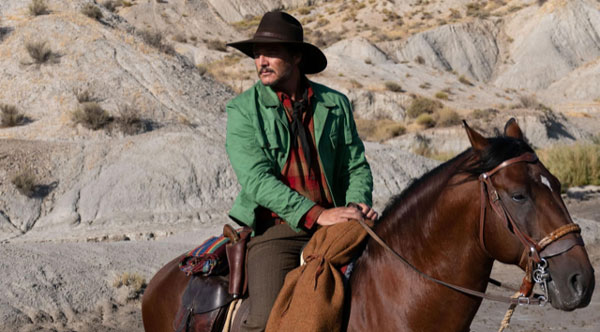
Two middle-aged men, styled to perfection like Western heroes Kirk
Douglas or Burt Lancaster, confront each other in a lover's quarrel. The
landscape is the classic moody desert flanked by mountain ranges. A rider
with a good Mexican face (Pedro Pascal) approaches an office where the
sheriff (Ethan Hawke) has just decided to bring in a murder suspect. We
hear the sounds of a strange Portuguese song in what seems to be a
woman's voice. The camera pans to the singer: a young cowboy
(Manu Rios) with dreamy eyes and a woman's pouting lips. He strums his
guitar in front of the office, singing in falsetto. The rider gives him a long,
appreciative look – and within these few moments we are already solidly in
Almodóvar's universe, where things are not what tradition suggests. (The
song, "Estranha forma de vida" or "Strange way of life" is the title of a 1959
Fado, sung by Brazilian singer Caetano Veloso and lip-synched by the
actor.)
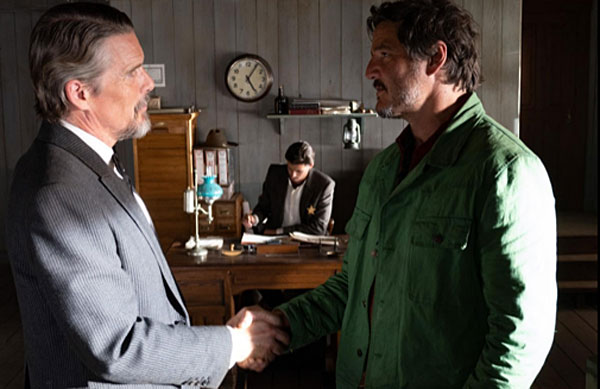
The rider, Silva, is greeted by the sheriff, Jake, an Anglo touch tight-jawed
and sharp-eyed, and no time is wasted before we know what connects the
two—a brief passion from twenty-five years ago. But now they are unlikely
bedfellows. Superbly played by Hawke, Jake has turned into a taciturn
emblem of "toxic masculinity," suspecting Silva has not come for him but
for ulterior motives. The man Jake is going to arrest for murder is Silva's
son. The unsuspected twist in this reunion of star-crossed lovers is that
Silva, a bear of a man, is at ease with feelings and has no qualms spelling
out that he came for love.
The effect of this "masculine-feminine" dichotomy in two equally tough
guys is almost comically shocking. It's so unlikely and yet so well done by
both actors that one could wonder which version is more absurd: the
classical Western devoid of any love or passion between men, or this
slightly melodramatic queerness.
The two men sit down to a plate of stew. "Did you cook this yourself?" Silva
wants to know. There are more than furtive glances of desire: "Don't look
at me like that!" Jake's resistance is the resentment of twenty-five years of
silence, but Silva spots the red neckerchief he once gave Jake, which Jake
has kept all this time. The film cuts to the prominent quilt-covered bed
with Silva standing at its foot, contemplating. Then we follow Jake's stare
down Silva's back to his pants bottom. He moves closer and kisses Silva's
neck.
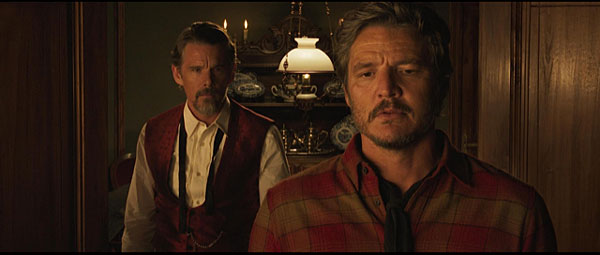
The fast clip of the scenes made me think of turning the pages of a photo
-novella -- a staple of Almodóvar's style that is always present like a
hilarious and ironic commentary. The next scene shows Silva in bed the
next morning, his buttocks now without pants. He gets up and can't find his
underpants (have they turned into a trophy like the neckerchief?). Jake
shouts from the bathtub to pick one from his drawer where pants and wife
-beaters are folded and stacked in perfect "feminine" (or is it OCD?) order.
But there is no romantic breakfast. The two can't agree on their desires and
split in a huff.
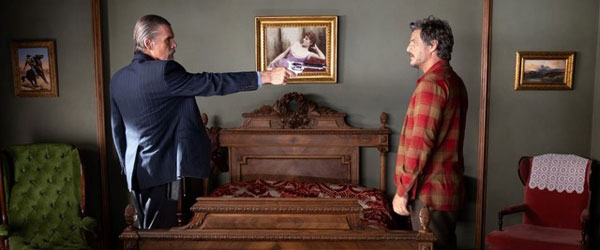
Jake follows Silva's tracks on a long ride to the son's ranch.
At their campfires at night, each man reminisces about their youthful
infatuation, and in these flashbacks, their roles are reversed.
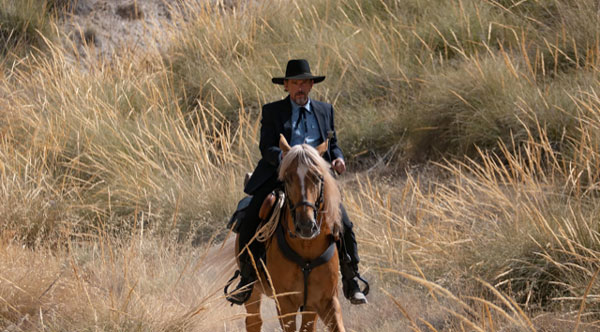
Silva's memory shows them as two cowboys (Jason Fernández as Jake and
José Condessa as Silva) fooling around with whores. They shoot holes into
a wine barrel, and all engage in a frenzy of drinking and kissing the wine
off the others' mouths and bodies. It's a marvelous bacchanal in high,
vibrant Almodóvar colors. There's a spontaneous greedy tangle between
the two men and the women withdraw with a grin: "There's nothing for us
to do here!" The scene of drunken lust amid laughter and innocent
disbelief is driven on by Jake. It's a marvelous, sexy scene --sensuous,
playful, and irresistible. Interestingly, Jake at his camp fire remembers the
later closeness of amorous looks and intimate kisses.
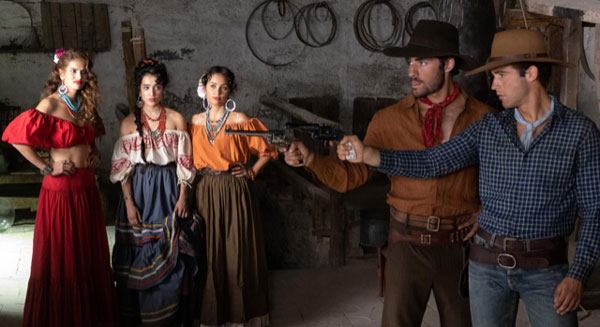
The brief story culminates when Silva's son Joe (George Steane) tries to
flee, Jake tries to stop him, and Silva tries to stop Jake from arresting or
killing his son. Each with a gun pointed – a scene delivered like the
Western climax par excellence.
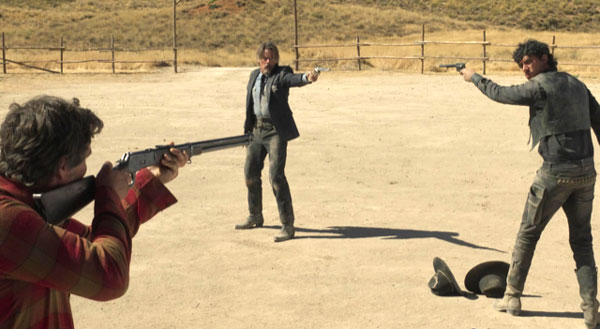
It's the sheriff who goes down – shot by his lover, while the son gets away.
But it's not the end. In another slyly comical twist, wounded Jake is now in
the hands of Silva who nurses him, oblivious to Silva's rage, and keeps
talking about his dream: two men, lovers, living together on a ranch,
helping and protecting each other. Jake won't hear of it. He turns his face
to the window with shades of scorn and longing in his eyes.
In the final shot the camera follows Jake's look through the window
outside, and while the credits roll, we see five beautiful horses playing in a
paddock in the deepening dusk – running, rearing, chasing, teasing,
bucking – a scene as innocent and irresistible as the bacchanale of the past.
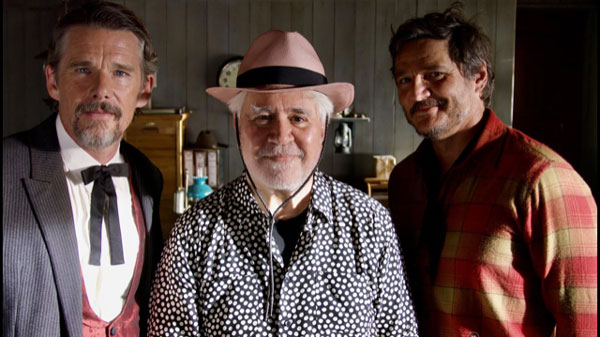
In the interview that closes the two shorts, Almodóvar explains why he
didn't film Brokeback Mountain. He thought he couldn't render the story
with enough sensuality in Hollywood. He repeatedly mentions his interest
in cowboy stories directed by women, especially Jane Campion's The
Power of the Dog (2021). His final scene with the horses looked to me like
an homage to Campion. In her story of repressed homosexuality the two
men living unhappily on a ranch are brothers. Her way of filming the
animals, cows and horses, is packed with the erotic sensuality the men can
only dream of.
At the end, the interviewer asks Almodóvar how his story would continue if
he extended it to a full-length feature. There would be another meeting,
another threesome at gunpoint, he says, but this time Silva would favor his
old lover and shoot his outlaw son. It would be no good, however. Jake
would again refuse to commit. As long as it's impossible to imagine queer
life, a gay couple in the Wild West, it sure is a strange way of life.
|